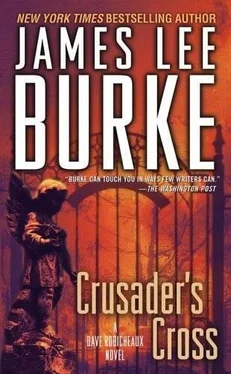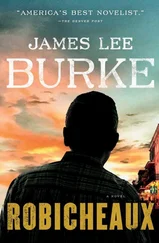I heard him sigh. "How about tomorrow?"
"I bought a birdhouse from Andre Bergeron. Inside the construction is a length of brass chain that looks like the piece you found on the Belloc woman… You there?"
"Why don't you take care of it?"
"Because I think Bergeron may be with my wife now," I replied.
I got in my truck and began backing up into the East Main. But a pearly limo with charcoal-tinted windows pulled to the curb and blocked my way. Someone in the backseat rolled a window down on its electrical motor.
"Get out of the driveway, Val," I said.
He sat on the rolled white leather seat, dressed in pleated beige slacks and a golfing shirt, a bottle of Cold Duck balanced on his knee. On the far side of him was a woman I didn't know. Her face was stiff with makeup, her blouse unbuttoned on the tops of her breasts. I saw her take the last hit on a roach and drop it out of the top of her window onto the street.
"Your wife shouldn't make remarks about Andre," Val said. "Big mistake."
"Say that again."
"Somebody told Andre how your wife made fun of him. Not good, Davey boy. No, no, not at all good," he said.
"You move your fucking car before I pull your teeth out," I said.
He laughed, spoke to his chauffeur, then rolled up his window while handing the bottle of Cold Duck to the woman, as though the world beyond the boundaries of his limo no longer existed.
I backed into the street, cars swerving and blowing around me, then ran the red light down by the Shadows and headed for Molly's agency.
On the way I punched in a 911 on my cell phone and asked the dispatcher to send a cruiser to the agency and one to Andre Bergeron's house in Jeanerette.
"What's the nature of the emergency, sir?" she asked.
"My wife's life could be in danger. Who is this?" I said.
She gave me her name. She was new on the job and obviously swamped with calls reporting traffic accidents and power outages. "Two of the bridges have been hit by boats and are closed," she said. "The bridge at Nelson's Canal might be open in a few minutes. But we can't be certain."
"Call Jeanerette. Ask them to send a city car to the Chalons property. Tell them to place the black man, Andre Bergeron, in custody."
"Sir, I can't do that without an explanation," she said.
"He's the Baton Rouge serial killer."
"Sir, I have to have verification of who you are," she replied.
I dropped the cell phone on the seat and steered around a truck from the electric company and a repair crew that was working on a downed power line. Up ahead, I could see the turnbridge at the confluence of Nelson's Canal and Bayou Teche. Evidently the huge sprockets on the bridge had jammed when it was partially opened, and now traffic had backed up for hundreds of yards on both sides of the bayou.
There was only one thing for it. I abandoned my truck and began running by the side of the road toward the bridge, my hand tight on my holstered.45. But even as I was running past the line of idling cars and the faces of the curious and the bemused, the image of Val Chalons seated in the back of his limo would not go out of my head. No, it was not his imperious or insulting manner that bothered me, or that he seemed to be embracing and flaunting the meretricious world represented by his mother and Lou Kale. It went beyond that, something that was raw, designing, inhuman, genuinely evil.
But what?
You're being set up again, I told myself.
But sometimes your only option is to play out the hand, no matter what the consequences. Sometimes when you're deep in Indian country, the only speeds available are full throttle and fuck it.
The bridge's rotary system had locked against itself when the steel grid was only five feet from the asphalt. I backed off, then jumped into space and landed upright with a loud ping on the metal. People were starting to get out of their cars and stare. I raced to the other end of the bridge and jumped again, this time skinning my elbow and tearing the knee of my trousers on the road surface.
I got up and starting running toward the rear of the traffic jam. A fat man wearing a silver suit and a Stetson short-brim was getting out of a huge purple Cadillac. The factory hood ornament on the Cadillac had been replaced with a pair of needlepointed brass cattle horns. "What the hell is going on?" the fat man said.
"How much gas is in your car?" I said.
"Gas?"
"This is an emergency situation," I said, opening my badge holder in his face. "I'm taking your vehicle."
"Not my car, you're not. I've got to be at the Oil Center in Lafayette in thirty minutes."
"In about thirty seconds you're going to be on the ground in cuffs," I said.
I got behind the wheel, and with the driver's door still open I backed straight down the two-lane to the next intersection, cut the wheel, then floored the accelerator down Old Jeanerette Road toward Molly's agency, slamming the door as the cement raced by me.
I ran a stop sign at eighty, clipped a mailbox and a garbage can, passed a tractor-drawn cane wagon, and forced an oncoming truck into a rain ditch. Water oaks along the road and collapsed barbed-wire fences and shacks and single-wide trailers with broken windows sped by me, then I saw Molly's compound up ahead.
The grounds were empty, the blinds drawn in the administration building, the St. Augustine grass green and stiff with the rain, an inch higher since yesterday. I pulled into the entrance, my heart hammering, sweat breaking on my forehead. I saw no sign of Molly's car, nor any other vehicle.
Think, I told myself. Would Molly have gone to Andre Bergeron's house to confront him about the unauthorized use of her farm tools? No, she did things in a measured way and was not a compulsive person. Normally, she would have telephoned a person who had wronged her, asked him to explain himself, perhaps invited him to come by and have coffee and talk with her. That was Molly Boyle's way.
But Molly's recorded telephone message had mentioned that she was "disappointed" and the fact that someone had borrowed her tools without permission "again." She may not have been an obsessive person, but she had a low level of tolerance for people who lied or violated the trust of others, which she always referred to as an act of spiritual theft.
I parked by the administration building and rattled the doors, then walked next door to the cypress cottage which Molly used to share with a nun who had returned to the Midwest to care for her mother. The nun's car was parked under a pecan tree, covered by a clear plastic tarp fogged with humidity and pooled with wet leaves and bird droppings.
I wiped my face with my shirt. The air stank of stagnant mud, raw sewage backed up from the treatment plant, the bloated body of a drowned cow that gars were feeding on in the shallows. I could hear bottle flies buzzing inside the plastic tarp on the nun's car.
When the sun broke through a cloud, the tops of the cypress trees along the bayou lit up as though they had been touched with a flame. I saw an aluminum boat snugged inside a clump of flooded willows, its motor pulled out of the water, an anchor consisting of a cinder block threaded by a rope thrown up on the bank.
Forty yards downstream, Molly's car was parked behind the barn, wedged between the back wall and the remains of a disease-eaten mulberry tree that had been uprooted by the storm. Both the driver and passenger doors hung open.
I felt a wave of nausea and fear wash through my system. I ran back to the tarp-covered vehicle of Molly's friend, a pressure band like a strip of metal tightening against the side of my head. I meshed the plastic in both hands and ripped it free of the roof, showering myself with water and birdshit. A cloud of beetles and greenflies and a stench of rats rose into my face. But there was no one inside the car and no footprints around the trunk area.
Читать дальше












